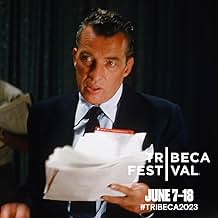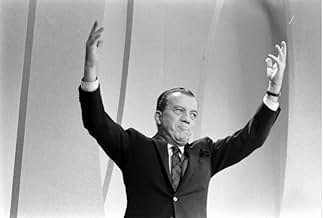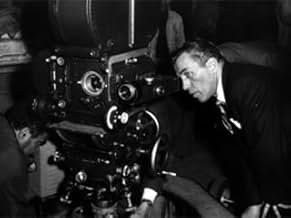Ed Sullivan quebrou barreiras ao contratar artistas negros em seu programa de variedades de domingo à noite. Este documentário destaca o legado de igualdade do pioneiro da TV.Ed Sullivan quebrou barreiras ao contratar artistas negros em seu programa de variedades de domingo à noite. Este documentário destaca o legado de igualdade do pioneiro da TV.Ed Sullivan quebrou barreiras ao contratar artistas negros em seu programa de variedades de domingo à noite. Este documentário destaca o legado de igualdade do pioneiro da TV.
The Beatles
- Themselves
- (cenas de arquivo)
James Brown
- Self
- (cenas de arquivo)
Diahann Carroll
- Self
- (cenas de arquivo)
Johnny Carson
- Self
- (cenas de arquivo)
Nat 'King' Cole
- Self
- (cenas de arquivo)
Sammy Davis Jr.
- Self
- (cenas de arquivo)
Jackson 5
- Themselves
- (cenas de arquivo)
Mahalia Jackson
- Self
- (cenas de arquivo)
John F. Kennedy
- Self
- (cenas de arquivo)
Martin Luther King
- Self
- (cenas de arquivo)
Gladys Knight
- Self
- (cenas de arquivo)
Rosa Parks
- Self
- (cenas de arquivo)
Elvis Presley
- Self
- (cenas de arquivo)
Bill Robinson
- Self
- (cenas de arquivo)
Avaliações em destaque
As a child, I was raised on the Ed Sullivan Show and it was because of his many Black guests and artists that I realized that I was Black. With only the "Amos and Andy" representation on national television, which I could not relate to and my being light-skin, I thought I was white even though my family represented many cultures and races. Programmed to believe that Black folks did not have nor deserve a presence in this country, Ed Sullivan did something about it. "Leave It To Beaver" was not my brother. "Donna Reed Show" was not my mother. To be brave enough in spite of the naysayers, he accomplished what many were afraid to. Music heals and music, much like a buffet, offered us a variety of complex emotions to just plain feel good vibes. It's all documented in this documentary. I only wish Ed was alive to see this. Thumbs up to this production and its crew.
What a great tribute to Ed Sullivan as well as all of the Black artists. I remember watching Ed his last few years and he had a lot of guests that were singers as well as dancers, acrobats, comedians and everything else you can image. I had no idea he was such a champion for the colored artists and that he hand picked every act! It's safe to say that many of the colored artists in the 60's owe Ed their careers.
Barry Gordy Jr and Motown was especially appreciative.
I knew a little about his back ground, getting started as a sports writer and columnist and then moving up the ladder and finally getting chosen by CBS to be the host of his own show and changing the way we spent Sunday nights..
Barry Gordy Jr and Motown was especially appreciative.
I knew a little about his back ground, getting started as a sports writer and columnist and then moving up the ladder and finally getting chosen by CBS to be the host of his own show and changing the way we spent Sunday nights..
Sunday Best is more than a music doc. It's a celebration of talent, resilience, and cultural history. It shines a light on how Ed Sullivan gave Black performers a national stage at a time when so few others did. The archival footage is incredible and the stories are deeply moving. It's beautifully done, thoughtfully edited, and full of heart. You walk away feeling both heartbroken by what these artists endured and grateful that their voices were seen and heard. The performances give you chills. The interviews and context stay with you. This film honors the past while making it feel urgent and alive. I honestly can't recommend it enough.
How television's first presenter, Ed Sullivan, changed the very fabric of the USA by having Black musicians appear on his high rating show, opening doors nationwide for these artists during a time of segregation and injustice. There are great performances from James Brown, The Supremes, Jackie Wilson, plus a very young, Stevie Wonder, and even a much younger Michael Jackson with his older siblings. Every great music artist from the fifties and sixties made an impact on one of the greatest variety show. A well structured and uplifting documentary on an influential humanitarian who saw all humans as equal, and never took a step back...
Many of us remember The Ed Sullivan Show growing up - the program that introduced us to the Beatles. Elvis, opera, Topo Gigio, and dozens upon dozens of black entertainers during profound civil unrest in our country.
Today the unrest is of a slightly different kind - but to hear someone in the '60s claim that blacks were taking our jobs had a very familiar ring to it.
Ed Sullivan, a columnist who became a television icon - pioneered featuring black artists on his show: Stevie Wonder, Pearl Bailey, Ike and Tina, Nina Simone, the Supremes, Diahann Carroll, the Jackson 5, Harry Belafonte, the Temptations- giving many artists their start.
Fortune favors the bold, and there was no one more fearless than Ed Sullivan, who didn't hesitate to bring black artists into Southern homes.
What impressed me was how he held the artists' hands, patted them on the back, hugged them, at a time when some people would find that shocking.
Born in Harlem, then heavily populated by the Irish, Sullivan had an open-minded dad who knew minorities coming into this country had always suffered.
I was left asking myself what happened to courageous people like Sullivan, like Carl Laemmle who founded Universal Studios and then saved 308 Jewish families from the Holocaust, like Rosa Parks, like Charles Shultz, who refused to remove a black child from a Peanuts cartoon, who fought for what they knew was right, who refused to be cowed or intimidated. Today I see a lot of fear.
I highly recommend this documentary for its wonderful memories and a reminder that once there were people who bucked the system.
Today the unrest is of a slightly different kind - but to hear someone in the '60s claim that blacks were taking our jobs had a very familiar ring to it.
Ed Sullivan, a columnist who became a television icon - pioneered featuring black artists on his show: Stevie Wonder, Pearl Bailey, Ike and Tina, Nina Simone, the Supremes, Diahann Carroll, the Jackson 5, Harry Belafonte, the Temptations- giving many artists their start.
Fortune favors the bold, and there was no one more fearless than Ed Sullivan, who didn't hesitate to bring black artists into Southern homes.
What impressed me was how he held the artists' hands, patted them on the back, hugged them, at a time when some people would find that shocking.
Born in Harlem, then heavily populated by the Irish, Sullivan had an open-minded dad who knew minorities coming into this country had always suffered.
I was left asking myself what happened to courageous people like Sullivan, like Carl Laemmle who founded Universal Studios and then saved 308 Jewish families from the Holocaust, like Rosa Parks, like Charles Shultz, who refused to remove a black child from a Peanuts cartoon, who fought for what they knew was right, who refused to be cowed or intimidated. Today I see a lot of fear.
I highly recommend this documentary for its wonderful memories and a reminder that once there were people who bucked the system.
Você sabia?
- CuriosidadesSunday Best producer Margo Precht Speciale is also the granddaughter of legendary TV host Ed Sullivan.
Principais escolhas
Faça login para avaliar e ver a lista de recomendações personalizadas
Detalhes
- Data de lançamento
- País de origem
- Central de atendimento oficial
- Idioma
- Também conhecido como
- Sunday Best: The Untold Story of Ed Sullivan
- Empresas de produção
- Consulte mais créditos da empresa na IMDbPro
- Tempo de duração
- 1 h 30 min(90 min)
- Cor
Contribua para esta página
Sugerir uma alteração ou adicionar conteúdo ausente
























